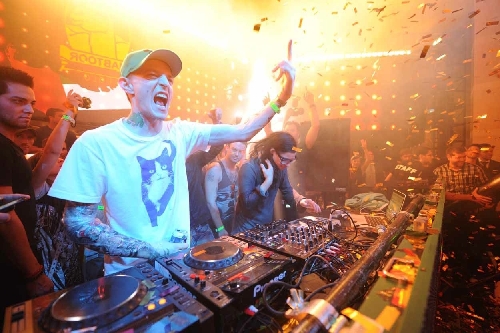Popular club DJs earning plenty of scratch

DJs earn $100,000 in Vegas. For one night. Not all of them. Just the stars. But still — 100K!
“There’s a helluva lot of money to be made here,” says DJ Times magazine Editor Jim Tremayne.
Big-name DJs cause bidding wars to erupt among top clubs, from Marquee to XS, Surrender and a score of rival clubs and dayclubs.
Tremayne says Swedish DJ Avicii has not only pocketed six figures on the Strip, “I know he’s turned down six figures here, too.”
And why shouldn’t star DJs collect huge fees? Encore Beach Club has clocked 8,000 people in one Sunday afternoon for a few hours of Kaskade.
That’s twice the number of people who saw Paul McCartney at a sold-out show at the Hard Rock Hotel’s Joint.
Get this: Marquee can swing 4,000 to 5,000 through its front doors on a Monday night. Do you hear me? On. Any. Monday.
The value of a star DJ goes like this:
When Deadmau5 attracts thousands of clubbers, fans don’t just pay to attend and buy drinks.
VIPs (rich folks, group sales and corporate show-offs) buy any of dozens of booths and cabanas for $500 to $5,000, depending on the club or dayclub.
The club then benefits from aftershocks that persist for months in the minds of returning clubbers: This is where Steve Aoki spins, even if he’s not spinning tonight.
But here’s the question we pose to the editor of DJ Times: If some DJs don’t do much more than press the play button on a laptop, is there any difference between them and 1970s disco DJs?
“Not really,” Tremayne says, speaking theoretically. “DJ technology is such now where you can load up sets and it’ll mix for itself.”
But realistically, as Tremayne says, the best DJs exhibit skills ranging from subtle to powerful.
“A lot of it comes down to your selection” of songs, Tremayne says. “A lot of it comes down to overlays, effects and the order of tunes you’re playing.”
Also, you can’t assume every DJ is just pressing one or two buttons to pick up a paycheck. There are three types of DJs. Allow me to coin some phrases:
“Paycheck DJs” merely choose songs in a sequence.
A broad middle of “Mood DJs” play a series of songs while tweaking them here or there with a knob twist or two.
And “Sensory DJs” work the hardest, constantly mixing song elements together live, while adding effects, blending sound and vibe in ways musicians would.
Now let’s play devil’s advocate. If clubbers don’t care if a DJ isn’t working hard at a mix, then what does it matter? They’re still having fun listening to the music and staring at the famous DJ, right?
At this summer’s Electric Daisy Carnival, the three guys of Swedish House Mafia sometimes seemed only to jump up and down for long periods of time, rather than do a lot of sound mixing, while thousands of night revelers screamed in delight at their playing of songs.
Or consider Skrillex. He is a phenomenal producer of his own records. His original songs “First of the Year (Equinox)” and “Scary Monsters and Nice Sprites” are madcap, ground-and-pound dubstep hits.
Skrillex has saved dubstep. He reinvented dubstep into a pop-melodic, yet rough-hewn groove. And his records are reshaping club music at this very moment.
“He has so much more game than any of the other producers,” Tremayne says. “He’s remarkably talented.”
Yet in person, Skrillex can at times appear not to be working the music as hard as he works a cigarette. But does that matter?
As Tremayne argues, Skrillex’s song mixes move crowds like you wouldn’t believe.
“He puts out so much energy. I used to go to punk rock shows back in the day. I haven’t seen that much energy since I saw Bad Brains or the Circle Jerks. It’s crazy,” Tremayne says.
“I saw him at the Detroit electronic music festival,” he says, “and it bordered on dangerous. It was like a Metallica show.”
So basically, what we have here is a genre version of DJ.
Club DJs become stars by producing: by creating original songs in the studio, and/or by mixing other people’s songs in the studio.
When club DJs perform live, they don’t work as hard as hip-hop scratch DJs; none burns a turntable for 90 minutes the way Mix Master Mike can.
But club DJs work harder than the vinyl DJs of the “Saturday Night Fever” disco era.
As a result, club DJs make more money, and are more famous and revered, than your mom, by far. They are The New It Paradigm Hope Change Thing.
Doug Elfman’s column appears Tuesdays, Thursdays and Fridays. Contact him at delfman@reviewjournal.com. He blogs at reviewjournal.com/elfman.












